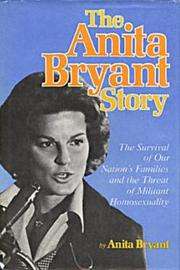The Anita Bryant Story
 Cover of the first edition | |
| Author | Anita Bryant |
|---|---|
| Country | United States |
| Language | English |
| Subject | Anita Bryant |
| Published | 1977 |
| Media type | Print (Hardcover and Paperback) |
| Pages | 156 |
| ISBN | 978-0800708979 |
The Anita Bryant Story: The Survival of Our Nation's Families and the Threat of Militant Homosexuality is a 1977 book by Anita Bryant, in which Bryant provides an account of her evangelical Christian campaign against a gay rights ordinance in Dade County, Florida. The claims Bryant makes about homosexuality in the book have been criticized as false and unscholarly in nature.
Summary
Bryant provides an account of her evangelical Christian campaign against a gay rights ordinance in Dade County, Florida. She writes that homosexuality is spread through recruitment, and that gay people can change their sexual orientation.[1] Bryant writes that "The women's liberation programs...have weakened family ties", that "single men are the chief source of crime and social disruption", that "marriage is essential to male socialization", and that "as the more liberal life-styles come into the open, divorce rates soar, leaving the debris of human tragedy behind to suffer. The debris? Our children." Bryant calls the gay rights movement an "escape from sexual responsibilities and its display a threat to millions of young men who have precarious masculine identities."[2]
Scholarly reception
Casper G. Schmidt, in "The Group-Fantasy Origins of AIDS", an article published in the Journal of Psychohistory in 1984, writes that Bryant outlines the major issues of concern to opponents of gay rights. Schmidt comments that Bryant was correct in believing that repeal of the gay rights ordinance in Dade County would provoke a larger backlash against the gay rights movement.[2]
Law professor Richard Posner writes in Sex and Reason (1992) that while Bryant's book is not scholarly, it reflects widespread beliefs about homosexuality. Posner believes that many intellectuals share these beliefs, but are reluctant to voice them for fear of offending gay people. Posner criticizes Bryant's views, writing while the causes of a same-sex preference are not well understood, the main factors involved appear to be genetic, hormonal, developmental, or some combination thereof, not recruitment. Posner believes that Bryant's assertion that gay people can change their sexual orientation is false in most cases.[3]
See also
References
Footnotes
Bibliography
- Books